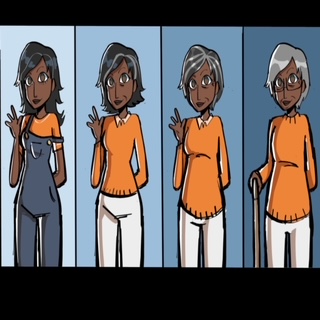As soon as we invented the wheel, humankind embraced machines to help us farm, irrigate, cut cloth and steel. We built cities linked with shipping routes, on land, sea and air. There’s no doubt that machines have made life easier for us. Artificial intelligence and its desktop cousin, the computer, and all its handheld relatives, have connected us to the global marketplace and made our world faster, smaller, and easier. At least when it works. As the saying goes, to err is human, to really mess things up you need a computer.
This month’s blog is all about how AI is already here, and how it will certainly make up our future interactions, whether we like it or not. I have to admit that thinking about Robots entering more and more into our homes initially unsettled me; I am sure many of our Discerning Seniors would agree. I mean, we’ve all seen the movies, right? The ones where the robots start off as benevolent members of the house or Starship, and then they take over, rendering us humans obsolete. Yet we already use so many forms of AI that I wholeheartedly support; Uber, Google, modern cars are more computer than engine, and I’d be lost without my GPS.
How will AI form part of our future, in particular as we age, and how will it allow us to concentrate on more fulfilling human interactions, while the machines get on with the menial work? Robots are now being developed to help us in our daily tasks, such as housework (the robotic vacuum that just whizzes around gleefully cleaning up after us), and in the bathroom. Robotic toilets open and close for us, they flush, spray us down and dry us after our daily constitutional, all the while allowing us more free time to spend it with our human community. The personal care robot would free our time to do our business at our leisure, not at the schedule allotted to a PSW. When I discovered that a PSW may only be allotted seven minutes per long term care resident, it’s not hard to see this as unnecessary pressure on both caregiver and resident. In fact, it might be inhumane to impose this time scarcity. A robot would allow the resident to attend to his or her needs without the emotional baggage associated with a PSW’s presence, maintaining our privacy, and supporting increased independent living. As we age and our mobility becomes more difficult, with limited PSW’s available who have sufficient physical strength to help us, here technology can fill the gap. Literally, robots could shoulder the physically demanding labour, so that our caregivers could spend time with us, connecting in an engaging and meaningful manner.
There’s certainly no one size fits all to our aging. What works for one person may not work for another. But upon further research into how we can use technology to help us age with greater ease, we will need to shift our perspective of AI from a threat to humanity, to helpful hand in our aging toolkit.





